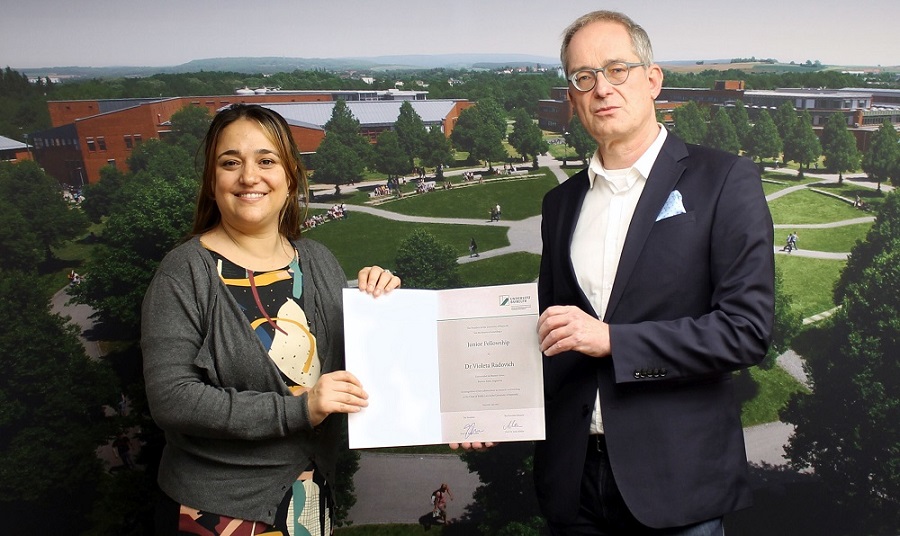Meet the Fellow: Violeta Radovich
International ocean governance beyond national jurisdiction – towards an environmental integrative approach based on participation of indigenous peoples and local communities
Violeta Radovich came to Bayreuth to investigate the ocean - far from the ocean, but next to her host, Prof. Dr. Eva Lohse, Public Law III, with whom she collaborates on topics like sustainability and participation on the high seas.

What are the foci of your joint research funded by the Fellowship?
Violeta Radovich: The focus of the research is to study the indigenous and local communities (IPLCs) participation provisions in the Draft Agreement of an international legally binding instrument on the conservation and sustainable use of marine biological diversity of areas beyond national jurisdiction (BBNJ) under the United Nations Convention on the Law of the Sea (UNCLOS). The main objective is to discuss whether these provisions may lead to sustainability on the high seas. We employ different criteria to evaluate them - mainly democratic features of environmental participation and decisions of human right bodies concerning participation. One vivid example of our collaboration is that the evaluation criteria that I am using to study these draft provisions is described in the books concerning participation edited by Prof. Lohse. Moreover, a recent publication of the Microplastics Group of Bayceer stated that rainfall causes microplastics transport into the atmosphere, which allowed me to justify when IPLCs state that everything is connected in nature. I have written a chapter that will be published in the book edited by Prof. Lohse on the topics sustainability and participation.
In what way is your work interdisciplinary, and what does interdisciplinarity mean to you in academic work and life?
VR: My work is totally interdisciplinary. I research on environmental conservation of the ocean. One cannot investigate the ocean without resorting to other sciences. Ocean regulation needs an integrative approach, a circular approach as claimed by IPLCs. My Co-Director in CONICET (Argentine Council on Scientific and Technical Research) is an oceanographer. I am a Professor and Researcher at the Navy War School, Argentine Defense University, where I lead interdisciplinary research projects and work with oceanographers, sociologists, politicians, economists, historicians. Interdisciplinarity is rewarding because you get the whole picture of the problem and therefore you may propose an integrative solution.
What is in your opinion the future of your field? In what way can research in your field contribute to meeting the urgent challenges of our time?
VR: I believe the ocean is the future. It occupies 70 per cent of the planet, it is the place where life started. The moon has been more investigated than the ocean. The ocean provides several ecosystem services: provisioning services (food, hydrocarbons, genetic resources, minerals), regulation services, cultural services. The ocean is the most important sink of dioxide carbon, so its role to combat climate change is essential.
What does international research mobility mean to you?
VR: International mobility is essential to researchers. We need to travel, open our minds, benefit from reading and talking with knowledge generators in other countries. Travelling from Argentina with my family in Covid times was an adventure that will mark our lives forever. But what is life, if not an adventure? It is not only about gaining research insights, but also about living daily in another culture, what makes these experiences so moving and rewarding.
How did the current challenges influence your cooperation?
VR: Bayreuth University campus is wonderful, it is circular, so integrative and inclusive to all sciences, as IPLCs claim. After remaining working at home due to COVID pandemic, Bayreuth campus has meant a boost of energy to me. Networking has been essential; we are now working with my host in a Horizons Project with colleagues from Tromso University and Kiel University. I have also benefited from talking with Prof. Thoko Kaime, Chairholder of African Legal Studies, and specialized in participation with regards to international rule-making and policy implementation. On December 14th, I will present the results of my research in a hybrid talk organized by FORNE (Group on sustainability research), led by Prof. Lohse.
The Fellow:
Prof. Dr. Violeta Radovich is a Researcher at CONICET (Argentine Council of Technical and Scientific Research). She holds a PhD in Maritime Law and a LLM in Environmental Law from University of Buenos Aires (UBA). She studies marine space regulation to mitigate and adapt global climate change impacts. She lead interdiscplinary research projects related to ocean conservation.
She is a tenured Associate Professor of Environmental Law at UBA, Senior Professor and Researcher at Universidad Nacional de la Defensa (UNDEF), and Associate Professor of International Organizations at Universidad Nacional de San Martín (UNSAM).
